Key takeaways:
- Identifying personal motivations, such as intrinsic values or passion for learning, is crucial for setting meaningful study goals.
- Utilizing the SMART criteria (Specific, Measurable, Achievable, Relevant, Time-bound) enhances goal clarity and makes them more attainable.
- Creating a realistic study plan involves assessing available time, prioritizing tasks, incorporating breaks, and allowing flexibility.
- Tracking progress through journals or visual aids fosters motivation and enables adjustments based on personal needs and changing circumstances.

Identifying your personal motivations
When I first started setting study goals, I realized I had to dig deep into what truly motivated me. Was it the dream of a specific career? The desire to impress my parents? Reflecting on these questions helped me understand my driving forces, and I discovered that fulfilling my personal passion for learning was the most compelling reason for my efforts. Have you ever paused to consider what truly inspires you to study?
I remember a time when I was struggling to find motivation for a particularly challenging subject. I decided to create a vision board filled with images and quotes that represented my goals. This simple exercise reignited my passion and reminded me of why I embarked on my academic journey in the first place. Engaging with your emotions can empower you to set meaningful goals that resonate with your aspirations.
Identifying your motivations isn’t just about the “what”; it’s also about the “why.” Are you seeking knowledge for yourself, or is external validation steering your ambition? I’ve found that when I connect my goals to my intrinsic values—like personal growth or curiosity—my dedication deepens, and the path feels richer. Take a moment to explore your own motivations; it can be a game-changer.
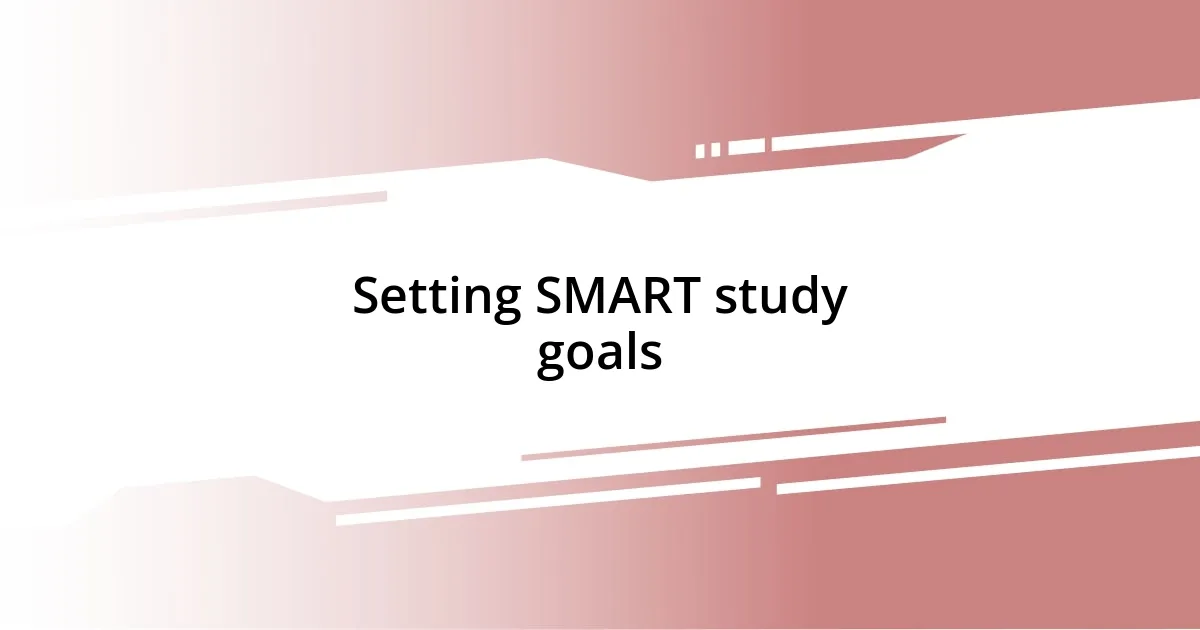
Setting SMART study goals
Setting SMART study goals involves ensuring that your objectives are Specific, Measurable, Achievable, Relevant, and Time-bound. I remember when I first learned about the SMART framework, it completely changed my approach to studying. For instance, rather than saying, “I want to study biology more,” I switched to “I will study biology for two hours every Tuesday and Thursday.” This specificity made my goals feel more attainable and structured my time effectively.
One of the biggest insights I gained from setting SMART goals was how measurable milestones kept me motivated. By breaking my study sessions into manageable tasks—like completing a chapter or taking a practice exam—the progress became tangible. I recall celebrating small victories, like finishing a tough module, which propelled me forward and instilled a sense of accomplishment. Have you ever noticed how tracking your progress can boost your motivation?
Achievability pertains to aligning your goals with your current situation and resources. I learned this the hard way when I aimed to cram an entire semester’s worth of material in a week—it was unrealistic and left me feeling overwhelmed. When I adjusted my expectations to fit my daily schedule and study habits, my stress levels decreased significantly, allowing me to absorb the material much more effectively.
| SMART Criteria | Description |
|---|---|
| Specific | Clearly define what you want to accomplish. |
| Measurable | Include criteria to track progress. |
| Achievable | Set realistic goals based on your current situation. |
| Relevant | Ensure your goals align with your broader objectives. |
| Time-bound | Set a deadline for your goals. |
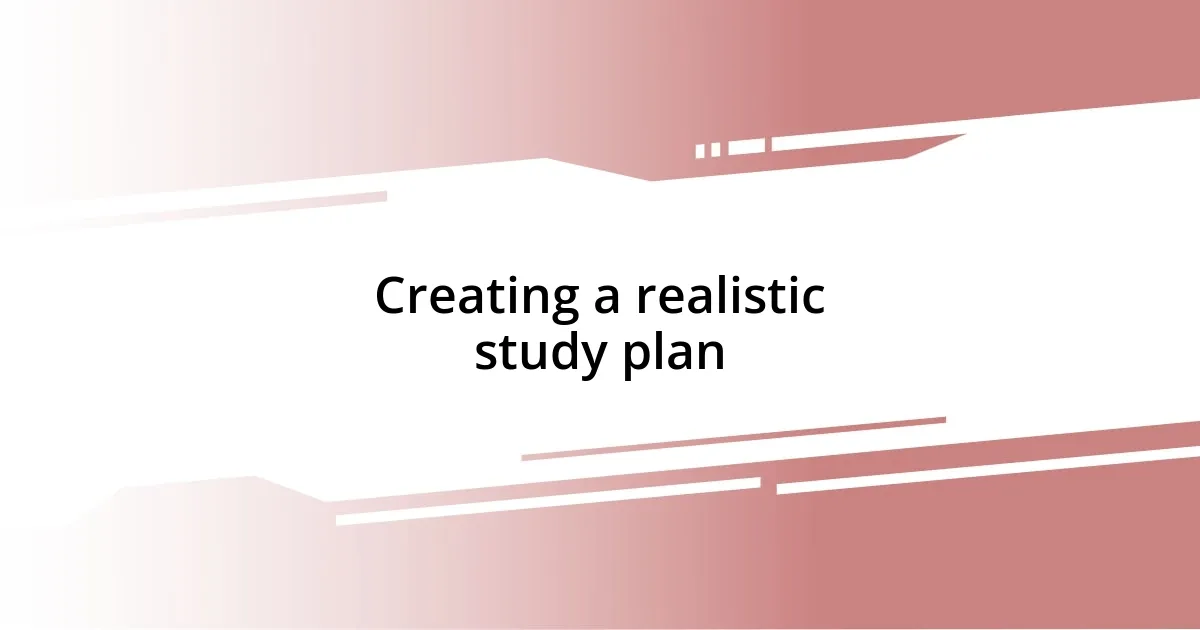
Creating a realistic study plan
Creating a study plan that feels realistic can be a game changer. I’ve often found that the best way to begin is to assess how much time I truly have available. For example, I’ve juggled part-time work and studies, and I learned the hard way that fitting a traditional study schedule into my busy life wouldn’t work. Instead, I started setting aside specific time slots during my day that allowed for breaks and flexibility, which drastically improved my adherence to the plan.
Here are some steps I’ve found helpful when crafting a realistic study plan:
- Identify available time: Look at your week and find consistent blocks of time for studying.
- Prioritize tasks: Rank subjects or topics based on their urgency and difficulty to allocate your time effectively.
- Incorporate breaks: Schedule short breaks to recharge; I often reward myself with a quick walk or snack after a productive study session.
- Stay flexible: If something comes up, adjust your plan instead of scrapping it entirely. I learned to shift my study times around rather than feel defeated.
- Set boundaries: Let others know when you’re unavailable to maintain focus during your study times.
Always remember, consistency is key, but so is balance. There was a time I was too rigid with my plan, leading to burnout. I discovered that allowing myself buffer time made the process feel less stressful and much more sustainable. So, think of your study plan as a living document—it needs to evolve based on your needs and circumstances.
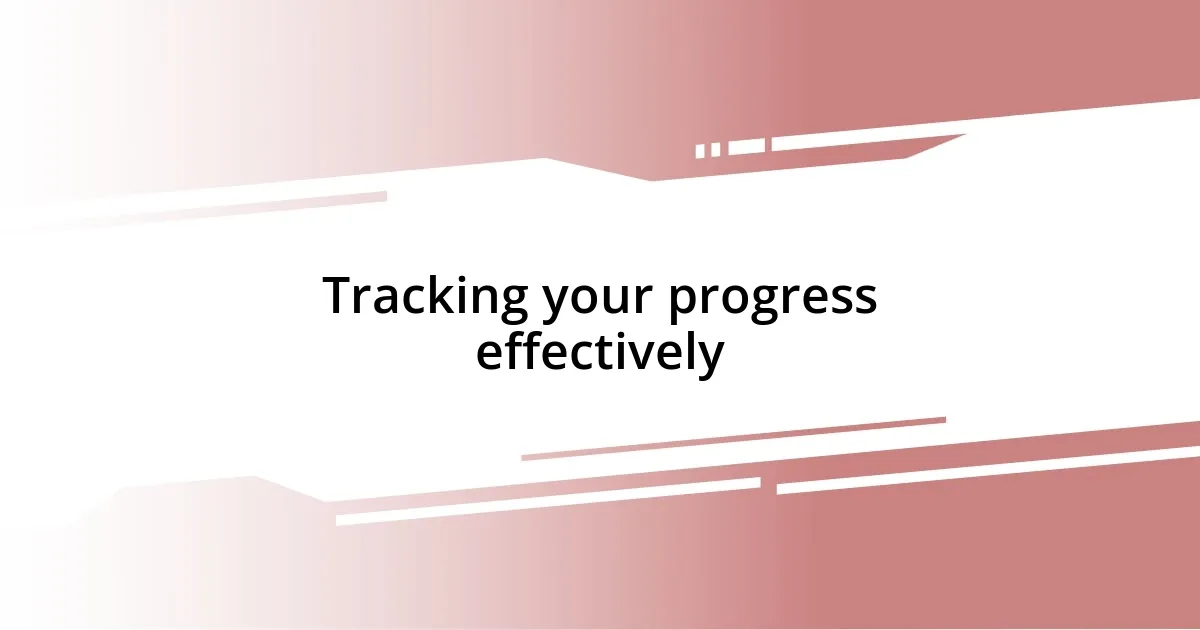
Tracking your progress effectively
Tracking your progress is an essential part of achieving your study goals. I’ve found that maintaining a dedicated journal or digital tracker really helps me keep tabs on my advancements. Each time I complete a task, I make a note of it, and looking back at my entries creates a sense of satisfaction. Have you ever felt that rush of accomplishment when you check off a task? It’s that little boost that keeps me moving forward.
Another effective method I’ve used is creating visual aids, like charts or graphs. When I stumbled upon this technique, it transformed my perspective on progress tracking. For instance, I once charted my daily study hours over a month, and seeing the upward trend gave me a real sense of pride. It’s motivating to visualize how far you’ve come, isn’t it? The process feels rewarding, making the journey more engaging rather than just focusing on the destination.
Lastly, I make it a point to schedule regular reflection sessions, perhaps once a week. During these moments, I assess what’s working and what isn’t, allowing me to pivot if needed. I remember a particularly tough week when I realized I was burning out. I adjusted my study tactics, which made a world of difference. Finding time to review your progress can foster growth and clarity, making your study journey even more fulfilling. Have you tried writing down how you’re feeling about your study progress? It can be incredibly eye-opening!
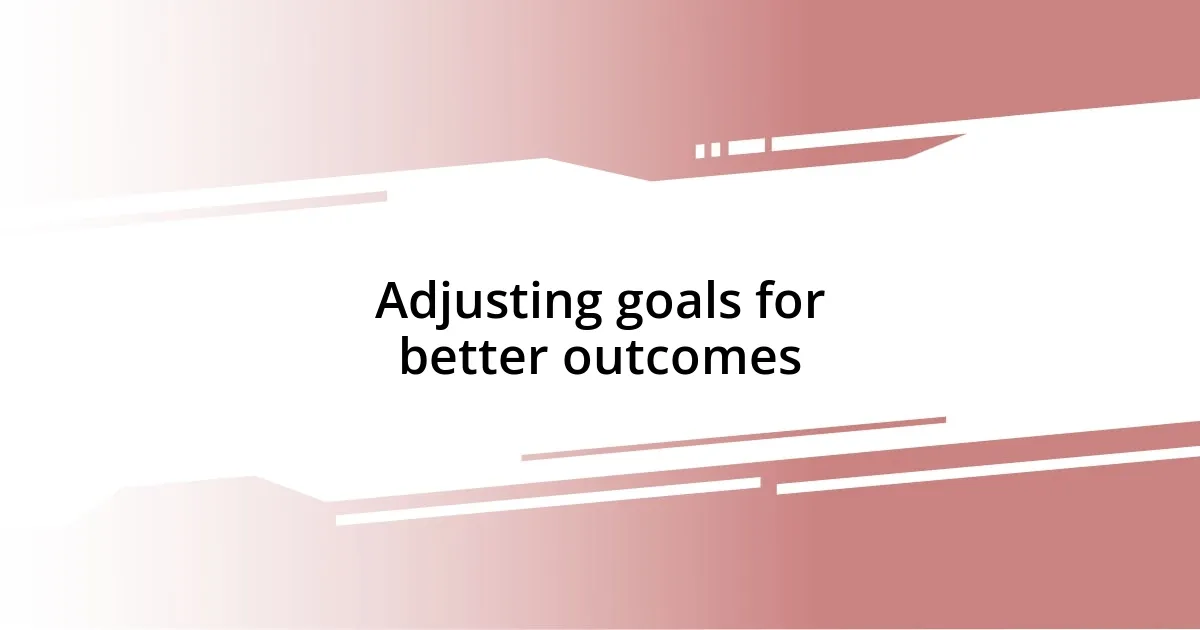
Adjusting goals for better outcomes
Adjusting goals is essential for achieving better outcomes in your study journey. I remember a time when I aimed for such high marks that I felt miserable. It dawned on me that I needed to recalibrate my expectations; I didn’t just want to succeed—I wanted to enjoy the process as well. By breaking my overarching goal into smaller, attainable milestones, I found a sense of progress that revitalized my motivation.
Sometimes, life throws curveballs that make sticking to your initial goals unrealistic. Have you ever attempted to study while juggling personal responsibilities? I often face that challenge. I learned to regularly reassess my commitments and adjust my study goals accordingly. For instance, when a family obligation arose, I shifted my objectives for that week. Instead of feeling guilty for not completing everything, I embraced the shift, which allowed me to maintain focus without overwhelming stress.
It’s also crucial to listen to your own needs throughout your study process. Have you ever pushed through fatigue, only to find your productivity dwindling? I certainly have. When I recognized the importance of adjusting my goals based on my physical and mental state, everything changed. I began setting goals that aligned not only with my academic aspirations but also with my energy levels. This holistic approach fostered a healthier relationship with studying, one that left me feeling fulfilled rather than burnt out.
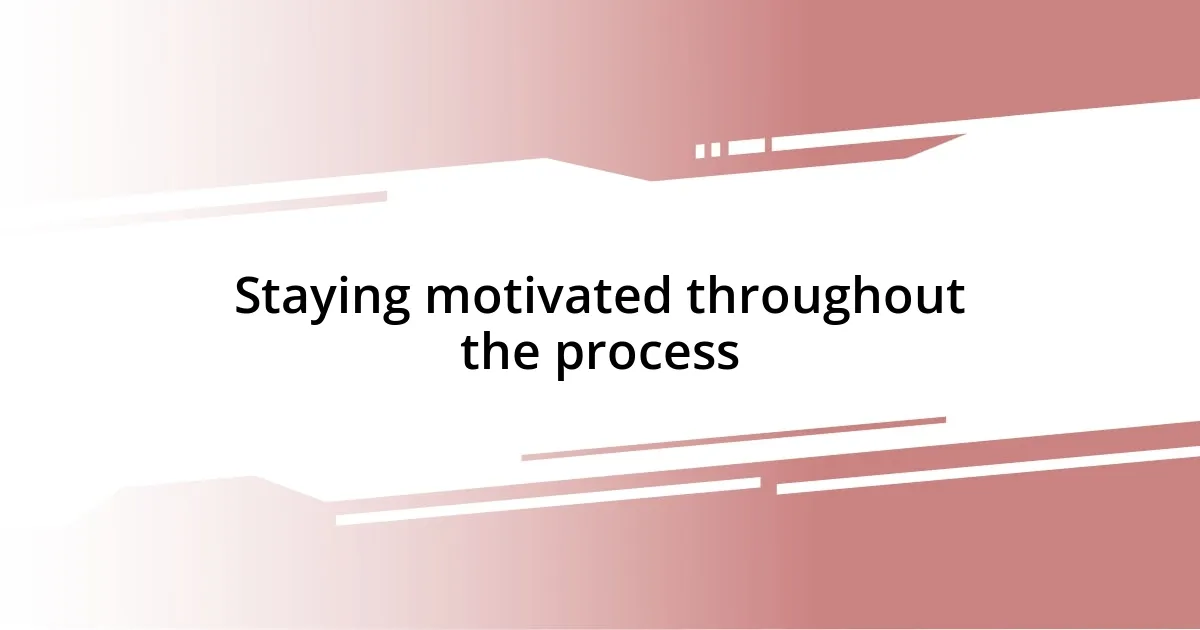
Staying motivated throughout the process
Staying motivated during the study process can be a challenge, but I’ve discovered that rewarding myself after achieving milestones really helps. For example, when I finished a particularly tough chapter, I allowed myself a small treat—maybe a favorite snack or an episode of my favorite show. Have you ever experienced that surge of excitement when you reward yourself? It reinforces your efforts and adds a lighter touch to the sometimes heavy study routine.
Another strategy that works wonders for me is involving friends or study partners in my journey. I recall one semester when I teamed up with a friend; we made studying a social event. We would quiz each other, share notes, and have study breaks filled with laughter. Isn’t it fascinating how the mere presence of someone else can keep you accountable? Plus, that camaraderie turns study sessions into enjoyable experiences rather than solitary chores.
Finally, I think it’s important to stay connected to your “why.” Reminding myself why I’m studying helps me keep my eyes on the prize. There were moments when I felt overwhelmed, and reflecting on my long-term goals provided clarity. When I remember that I’m investing in my future, that sense of purpose reignites my motivation. Have you tried writing down your reasons for studying? Sometimes, a simple reminder can be just what you need to push through, bringing back that initial spark of excitement.













